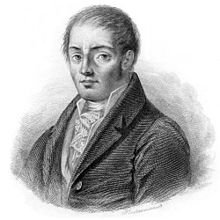Francesco Mario Pagano
| Francesco Mario Pagano | |
|---|---|

Francesco Mario Pagano
|
|
| Born |
8 December 1748 Brienza, Province of Potenza, Kingdom of Naples |
| Died | 29 October 1799 (aged 50) Naples, Kingdom of Naples |
| Nationality | Kingdom of Naples |
| Other names | Mario Pagano |
| Alma mater | University of Naples Federico II |
| Occupation | |
| Years active | 1768–1799 |
| Notable work |
|
Francesco Mario Pagano (8 December 1748 – 29 October 1799) was an Italian jurist, author, thinker, and the founder of the Neapolitan school of law. He is regarded as one of the most influential Enlightenment thinkers. A moderate reformist, he is seen as a forerunner of the Italian unification.
He was born in Brienza in the southern Province of Potenza. He studied at the University of Naples Federico II under Antonio Genovesi. At the age of twenty, he became special lecturer in moral philosophy there, at the same time practising law. He was friend of Gaetano Filangieri, entering the masonry with him, and was elected venerable master of the Neapolitan lodge "La philantropia". Pagano was one of the men who powerfully helped Italy in her social and scientific advancement and in the 1790s he had striven more than any other intellectual to give a political form to the 18th century reform tradition in southern Italy.
His work Saggi politici (1783–85) provided a philosophical history of the Kingdom of Naples, arguing against torture and capital punishment and advocating more benign penal codes. Considerazioni sul processo criminale (Considerations on the criminal trial, 1787), gave him international popularity and was much praised by Le Moniteur Universel, the main newspaper of the revolutionary France.
In 1794 he defended Vincenzo Galiani, Vincenzo Vitaliani and Emanuele De Deo – three alleged conspirators against Ferdinand IV; after they were sentenced to death, Pagano was deprived of his professorship, arrested, imprisoned and expelled from the kingdom. After fleeing Naples in 1796, he returned in 1799 and drafted the constitution of the short-lived Neapolitan Republic. The document bore similarities to the French Constitution of 1793 but presented original traits such as the institution of the "body of ephors", an authority who would have overseen the maintenance of the law. It is considered the precursor of the modern constitutional court.
...
Wikipedia
